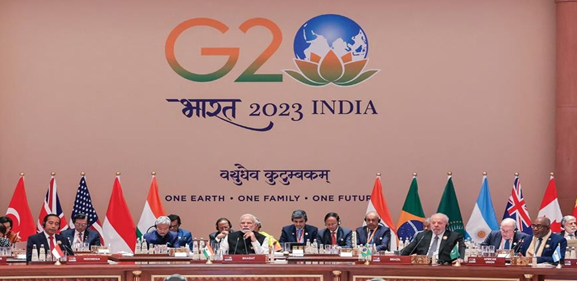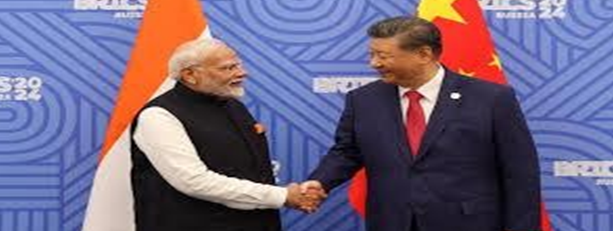
In an era marked by multipolarity, fragmented globalisation, and shifting power dynamics, India has emerged not only as a stakeholder but as a steward of multilateral engagement. No longer content to occupy a peripheral seat at global forums, India now confidently shapes the architecture of international governance. Its leadership within the G20 and the BRICS consortium exemplifies a calibrated blend of normative ambition, strategic autonomy, and developmental pragmatism, offering a compelling model of 21st-century diplomacy rooted in inclusivity, balance, and reform.
India’s presidency of the G20 in 2023 marked a transformative moment in global diplomacy. Guided by the civilizational ethos of Vasudhaiva Kutumbakam—“the world is one family” India moved beyond elite consensus toward a broader, more inclusive agenda. The theme, “One Earth, One Family, One Future,” was not mere branding but a declaration of intent: to universalise developmental priorities, elevate concerns from the Global South, and democratise global decision-making.

“Our mantra of One Earth, One Family, One Future in the G20 will pave a path for global welfare.” Prime Minister Narendra Modi
Under India’s stewardship, the G20 witnessed the historic inclusion of the African Union as a permanent member, an inflection point that redefined the forum’s geopolitical scope. India also introduced previously marginalised issues into the core of G20 discussions. Digital public infrastructure, supported by India’s successful Aadhaar, UPI, and CoWIN platforms, was framed as a global public good—scalable, open-source, and transformative. Likewise, India championed a more equitable approach to climate finance, emphasising adaptation alongside mitigation and foregrounding the asymmetries in climate vulnerability between the Global North and South.
“No group can claim global leadership without listening to those most affected by its decisions.” Prime Minister Narendra Modi, G20 Foreign Ministers’ Meeting, 2023.
India’s approach reflected a rare combination of epistemic humility and institutional confidence. Rather than prescribing solutions, it offered frameworks grounded in lived experience, inviting replication rather than imposing replication. In doing so, India expanded the grammar of development diplomacy and positioned itself as a credible agenda-setter within the G20.
India’s leadership within BRICS has been equally strategic, though more nuanced. Originally conceived as a counterweight to Western-dominated financialand governance structures, BRICS today is a complex platform with internal contradictions, most notably between India and China. Yet India has effectively managed these tensions while using the forumto promote South-South cooperation and advance institutional reform.

Through active participation in the New Development Bank (NDB), support for local currency trade, and infrastructure investment, India has contributed to diversifying the global financial architecture. It has consistently pushed for reform of global institutions, including the UN Security Council, while resisting the bloc’s instrumentalisation by any single power. India’s ability to build issue-based coalitions within BRICS without compromising its strategic alignments underscores its diplomatic dexterity.
“India seeks to add a non-Western layer to the existing world architecture… India is non-Western, India is not anti-Western.” External Affairs Minister Dr. S. Jaishankar, Hudson Institute, 2023
Dr. Jaishankar further emphasised, “India is looking to reorder the world not by pulling down the pillars of the existing order, but by reshaping it through a reformist mindset.” His remarks articulate India’s refusal to engage in confrontation for its own sake; instead, India seeks to balance continuity with change, tradition with innovation.
India’s commitment to democratic values and transparent institutions within BRICS serves as a subtle yet significant counterweight to authoritarian tendencies. It reinforces India’s view that emerging powers must not replicate the hierarchies of the past but should instead build a pluralistic, rules-based order that reflects contemporary realities.
At the heart of India’s multilateral engagement lies the doctrine of strategic autonomy, a legacy of non-alignment transformed into a framework for navigating 21st-century complexity. In a world where alliances are fluid and power dynamics unstable, India’s ability to maintain policy flexibility is both principled and pragmatic.
This multi-directional diplomacy has significantly enhanced its global stature as a credible and principled actor. This strategic agility enables India to foster inclusive coalitions that transcend ideological boundaries, reinforcing its role as a stabilising force and a catalyst for consensus in an increasingly fragmented international order.
“Multilateralism needs to be reformed to be credible. And it must be practised, not just preached.” External Affairs Minister Dr. S. Jaishankar, International Day of Multilateralism, 24 April, 2021.
India’s multilateral ambitions are deeply intertwined with its self-conception as the voice and vehicle of the Global South. This is not a rhetorical flourish, but a core policy orientation. The Voice of the Global South Summit hosted by India in 2023 was emblematic bringing together leaders from over 120 countries to collectively articulate development priorities too often excluded from elite global forums.
India’s message was unequivocal: global governance must reflect global realities. Issues like food security, debt relief, energy equity, and technology access are not matters of charity but of international justice. India’s own developmental journey, marked by democratic consolidation, digital empowerment, and targeted social protection, offers a replicable and respected model.
India’s leadership in multilateral initiatives such as the International Solar Alliance and the Coalition for Disaster Resilient Infrastructure further exemplifies its commitment to building coalitions around shared challenges. These are not symbolic platforms; they represent a newform of diplomatic leadership, collaborative, solution-oriented, and grounded in long-term resilience.
To be sure, India’s multilateral rise is not without challenges. Structural inequities in global institutions persist, and resistance to meaningful reform remains strong. India must also continue to strengthen its internal capacities, investing in diplomatic training, policy research, and institutional innovation to sustain its leadership over the long term.
Yet within these challenges lies opportunity. India is uniquely positioned to articulate andshape a renewed multilateralism, one that is inclusive, adaptive, and grounded in shared responsibility. Its ability to build trust, navigate complexity, and offer scalable solutions gives it a distinctive voice in a global order struggling to find coherence.
India’s role in platforms like the G20 and BRICS reflects a deeper shift not merely in status, but in substance. It is not just participating in global governance; it is helping to redefine its principles and priorities. By combining civilisational values with modern strategic insight, India are not only making roomat the table, it is reshaping the table itself.
As the world contends with cascading crises, from climate emergencies to geopolitical rivalries, India’s principled pragmatism offers a roadmap for a more just and effective multilateral order. The path forward will demand consistency, clarity, and convictionbut India appears increasingly prepared to meet that challenge with both vision and resolve.
Leave a Reply